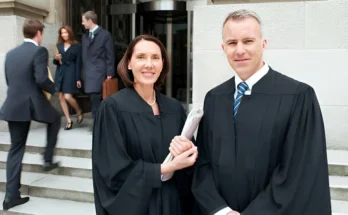Do you want to hire an attorney for your visa approval, but do not know how to? Read through carefully, this article is for you.
When faced with a legal problem, having the right lawyer can make all the difference. Legal books and online resources are excellent starting points but can’t replace personalized advice for complex issues.
This is where a lawyer’s strategic guidance, legal research, and advocacy become invaluable. Finding the right lawyer isn’t as simple as browsing advertisements or online listings; personal referrals, specialized online services, business referrals, and lawyer referral services offer more reliable options.
Once you have potential candidates, evaluate their expertise, communication style, and compatibility to ensure a successful partnership. Here’s more on how to manage the process from start to finish. But first, you should know when you need a lawyer.

Ways to Hire an Attorney for Quick Visa Approval
If you need a lawyer for your visa approvals, then here are some tips to help you manage the process from start to finish. Locating a good lawyer who can help get your visa approved isn’t always easy.
Don’t expect to find a good lawyer by reading an advertisement or looking online for a lawyer nearby. There’s not enough information in these sources to help you make a valid judgment.
Fortunately, you have other options. Here are a few helpful strategies:
1. Personal Referrals
One of the best ways to hire an attorney for quick visa approval is to talk to people in your community who have experienced the same problem you face.
If you talk to half a dozen people who had a similar legal problem, chances are you’ll come away with several good leads.
But don’t decide on a lawyer solely based on someone else’s recommendation. Different people will have different responses to a lawyer’s style and personality.
Make your decision about hiring a lawyer after you’ve met the lawyer, discussed your case, and decided that you feel comfortable working together.
Also, it might be hard to find a lawyer with the expertise you need through a personal referral. However, don’t give up immediately.
2. Online Services
Many sites, including Nolo.com, offer a way to connect with local lawyers based on your location and the type of legal case you have.
You answer a few questions about your case and provide your contact information. Then a lawyer specializing in the area you need contacts you directly.
3. Business Referrals
Businesses that provide services to key players in the legal area you’re interested in might also be able to help you identify lawyers you should consider.
These professionals regularly make informed judgments about business lawyers because they come in contact with them frequently.
4. Lawyer Referral Services

Lawyer referral services are another source of information. However, there is a wide variation in the quality of lawyer referral services, even though they are to be approved by the state bar association.
Some lawyer referral services carefully screen attorneys and list only those with particular qualifications and a certain amount of experience.
In contrast, other services will list any attorney in good standing with the state bar who maintains liability insurance. Before choosing a lawyer referral service, ask about the qualifications for including an attorney and the screening process.
Please note that what you might not get from a lawyer referral service is an insight into the lawyer’s philosophy. For instance, you won’t know the lawyer’s communication and litigation style.
5. Consider a Specialist
You should keep in mind that a “general practitioner” who practices in many legal areas might not know enough about the particular area of your concern to be effective.
It can pay to work with a lawyer who already knows the field, such as employment discrimination, zoning laws, software design, or restaurant licensing.
That way, you can take advantage of the fact that the lawyer is already far up the learning curve. A specialist might charge a little more, but it is often money well spent.
6. Interview the Prospective Lawyers
When you get the names of several good prospects, the next step is to talk to each personally.
If you outline your needs in advance, many lawyers will be willing to meet with you for a half-hour or so at no charge so that you can size them up and make an informed decision.
7. Personality
Pay particular attention to the personal chemistry between you and your lawyer. No matter how experienced and well-recommended a lawyer is, you might never achieve an ideal lawyer-client relationship if you feel uncomfortable with that person during your first meeting or two.
Trust your instincts and seek a lawyer whose personality is compatible with your own. Look also for experience, personal rapport, and accessibility.
8. Communication and Promptness
You want a lawyer who will work hard on your behalf and follow through promptly on all assignments. Ask all prospective lawyers how to contact them and how long it will take them to return your communications.
When Do You Need a Lawyer?
When you have a legal problem, you need information. Legal books written for nonlawyers and online websites are an excellent place to start.
Bar associations and nonprofit public interest groups often publish useful information that allows you to educate yourself on the law.
However, not all questions are answered by do-it-yourself materials, especially when you need individual advice tailored to your situation and when the legal matter is particularly complex. That’s when it’s time to see a lawyer. Lawyers can give strategic advice, research legal issues, and advocate on your behalf.
What to Expect From a Lawyer at the Initial Consultation
When you initially retain a lawyer, your lawyer should explain the options available in your legal matter.
Unfortunately, the complaint logs of all lawyer regulatory groups indicate that many lawyers are terrible communicators, but to be fair, some clients’ expectations run too high.
But then, anything longer than a few days is usually unwarranted. At a minimum, the office should contact you and explain the delay.
Attorneys know that nothing is more aggravating to a client than to have weeks or even months go by without anything happening and that it could be damaging to your case.
If your calls are unreturned, consider hiring a new lawyer before finding yourself in this situation. Before agreeing to retain your lawyer, you’ll want to feel confident in the attorney’s ability to competently advocate on your behalf, right?
The Application Process for Work Visas

Before applying for a work visa, your employer should file a work visa request with the USCIS. Once the petition is granted, you can begin processing your work visa.
The work visa application process includes:
- Preparing the request.
- Submitting the request to the USCIS and paying the filing fee.
- Waiting for a decision from USCIS. Regular processing can take weeks to months, but many US work visas offer premium processing for an additional fee.
- Attending the visa interview with the consular officer in your home country.
When you attend the visa interview, ensure you have the following documents ready:
- Printout of the confirmation page of your visa application
- Receipt of payment
- Passport-sized photos
- Receipt number of the employer’s approved petition
- Your passport
Have your passport stamped with your work visa after the interview.
Frequently Asked Questions
How to Know If Your Lawyer Is Working for You?
If you don’t know what’s happening in your lawsuit, you might assume you have a bad lawyer when your attorney is doing a great job.
Communication problems create tension in all types of relationships, including between an attorney and a client, and a lawyer who doesn’t communicate case progress invariably increases your stress.
What Do You Call a Lawyer in the US?
Some fused-profession jurisdictions use one term to describe lawyers. Also, US lawyers are typically called “attorneys”. Indian and Pakistani lawyers are known as “advocates”.
What are the Best Names to Call a Lawyer?
- Attorney
- Counsellor
- Advocate
- Counselor
- Solicitor
- Counsel
- Prosecutor
- Jurist
What is the Difference Between an Attorney and a Lawyer in the US?
Attorneys, lawyers, and counsels are trained in law. However, attorneys must pass the bar exam and practice law in court. Lawyers must also take the bar exam and may or may not practice law. Counsels provide legal advice and often work for an organization or corporation.
How Much Does It Cost to Hire a Lawyer in the USA?
The majority of attorneys charge by the hour. Attorneys charged a national average of $327 an hour in August 2023, while non-lawyers charged $178 an hour, according to Clio’s 2023 report. However, individual attorneys’ billable rates are typically determined by the size of their firm.



